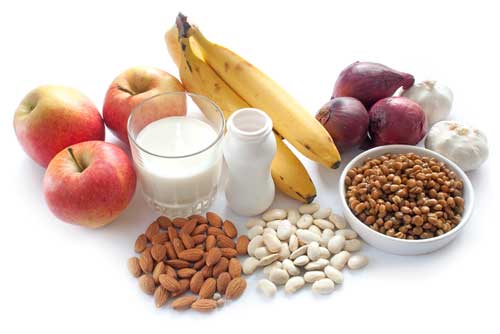In case you haven’t noticed, gut bacteria are getting lots of attention these days. You can hardly open a magazine that there isn’t a mention of “good” gut bacteria. No longer are all bacteria disease-causing pathogens we want to get rid of. Rather there are bacteria that peacefully make their home inside our intestinal tract that offer a number of potential health benefits.
These gut-friendly bacteria are referred to as probiotics: they’re essentially the “good guys” of the bacterial world. Research looking into the benefits of probiotics is still in its infancy. Preliminarily, these bacteria may aid digestive and immune health and possibly offer other health benefits as well.
Another term you may hear bandied about in relation to probiotics is “prebiotics.” Many people confuse the two terms or think both refer to gut bacteria – they’re actually different, although each plays a role in keeping your digestive tract healthy. First, let’s look at probiotics.
What Are Probiotics?
We’ve already given a brief definition of probiotics, but let’s look a little deeper. Inside your gut are trillions of bacteria that live peacefully in the dark, warm environment of your digestive tract. These bacteria aren’t simply “freeloaders,” they serve a useful purpose. For one, they break down and process nutrients your digestive tract can’t handle. In turn, they produce chemicals, including short-chain fatty acids, which help keep your digestive tract healthy.
The short-chain fatty acids probiotic bacteria produce are linked with colon health. Recent research shows production of these fatty acids may protect against colon cancer. Plus, short-chain fatty acids produced by probiotic gut bacteria may impact appetite hormones and play a role in obesity prevention. Production of short-chain fatty acids may based on animal studies, enhance absorption of minerals like calcium.
You may not be aware of it, but 70 to 80% of your immune system lies in your gut. Probiotic gut bacteria help “prime” this portion of your immune system and help it function more efficiently. Taking probiotics also helps prevent diarrhea related to antibiotic use. Probiotics may also be helpful for other intestinal conditions such as irritable bowel syndrome and inflammatory bowel disease.
All in all, the strongest evidence in support of probiotics is that they improve digestive health, although support for their role in immune health is growing too.
Sources of Probiotics
You get probiotics by eating fermented foods like yogurt with active cultures, kefir, tempeh, kombucha, sauerkraut, miso, kimchi, kefir and other foods that have undergone fermentation. Of course, you can also buy probiotic supplements, although you can’t be sure you’re getting enough of the right bacteria and that the bacteria are still viable when you take a supplement. When Consumer Labs tested a number of probiotic supplements, some of them fell short of having the number of organisms they claimed to have. For food to claim it contains probiotics, the probiotic bacteria must be alive. Just because they’re placed in a product doesn’t mean they survive. In addition, the bacteria must be species that offer health benefits.
What Are Prebiotics?
Prebiotics are non-digestible carbohydrates, or soluble fiber, that prebiotics feed on. They’re essentially the “food” gut bacteria need to grow, thrive and offer their benefits. Two of the most common prebiotics in food are insulin and oligofructose. When you find probiotics and prebiotics together in a food, they’re called synbiotics. Fiber-enriched yogurt is an example of a symbiotic food since yogurt already contains natural probiotic cultures and the added fiber is a source of prebiotics.
Foods that contain prebiotics include asparagus, artichokes, chicory root, leeks, jicama, oatmeal, onions, wheat bran, bananas and garlic. Adding prebiotics to your diet gives probiotic gut bacteria the food and energy supply they need. Plus, you get the benefits of added fiber.
Unfortunately, some people experience intestinal problems like gas and bloating when they consume prebiotics through diet or supplements. This may be a temporary problem that resolves once your digestive tract adapts, or a more persistent problem if you’re sensitive to fermentable fiber. Add prebiotics gradually to your diet, rather than “diving in” and ending up with intestinal distress.
Other Benefits of Prebiotics
Other than the important role of feeding probiotic gut bacteria, prebiotics have other benefits. The prebiotic inulin helps with blood sugar control, and consuming a diet rich in prebiotics may modestly lower cholesterol.
Just as you can buy probiotic supplements, prebiotic supplements are also available. These usually contain chicory root, inulin or long strands of carbohydrates called oligosaccharides. Why not enjoy the advantages of getting prebiotics naturally from food sources? Prebiotic-rich sources like oatmeal, bananas, garlic, onions, artichokes, and asparagus contain vitamins, minerals and phytochemicals you won’t get from swallowing a pill.
The Bottom Line
As you can see, prebiotics provide support for probiotic bacteria and offer some additional benefits as well. Hopefully, more research will clarify what probiotic strains are most beneficial for achieving particular health goals and how much you need to get through diet or supplements.
References:
Nutrition & Diabetes (2014) 4, e121; doi:10.1038/nutd.2014.23
Published online 30 June 2014.
World J Gastrointest Oncol. 2014 Feb 15; 6(2): 41-51.
Berkeley Wellness. “Probiotics: Pros and Cons” March 3, 2014.
Nutrition Journal 2013, 12:87 doi:10.1186/1475-2891-12-87.
J Nutr. 137 (11 Suppl): 2513S-2523S. PMID 17951495.
Proc Nutr Soc. 66 (3): 307-315. doi:10.1017/S0029665107005563.
Today’s Dietitian. 2006;8(8):12.
Nat Rev Gasteroenterol Hepatol. 2014;11(8):506-514.
Related Articles By Cathe:
Can Probiotics Help with Exercise Recovery?
Are Probiotic Supplements Overhyped?
The Problem with Probiotic Supplements: Are They What They Seem to Be?
Fermented Foods vs. Probiotic Supplements: Is One Better Than the Other?
Work Out Hard? Here Are 3 Reasons Why You Need More Probiotics in Your Diet
Probiotics: Can Friendly Bacteria Help You Lose Weight?


